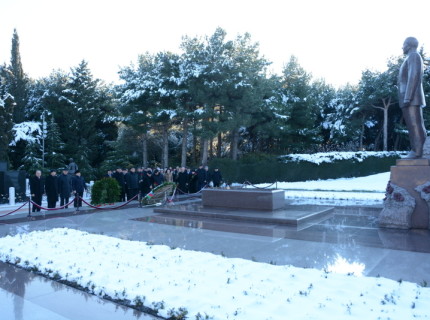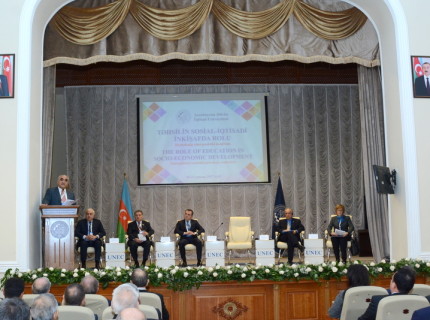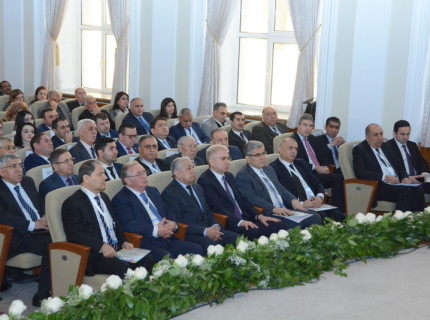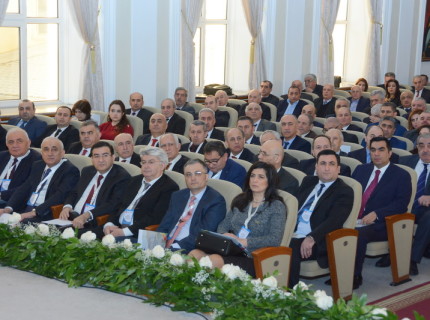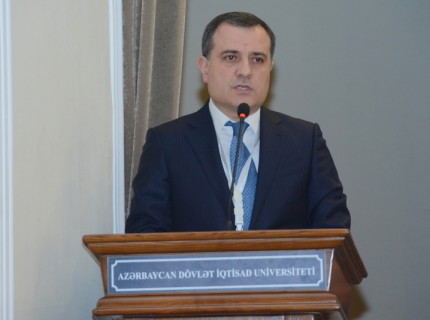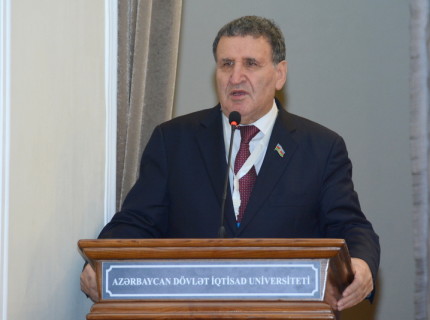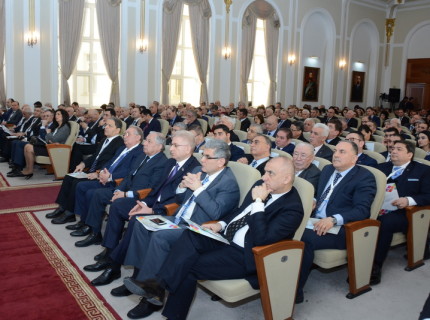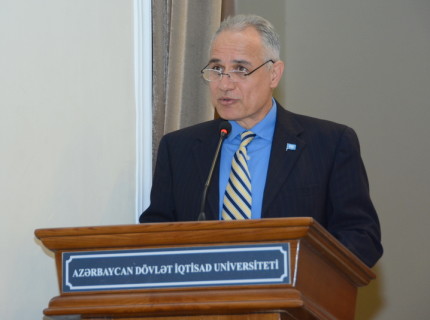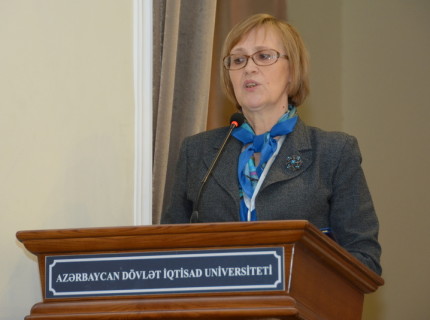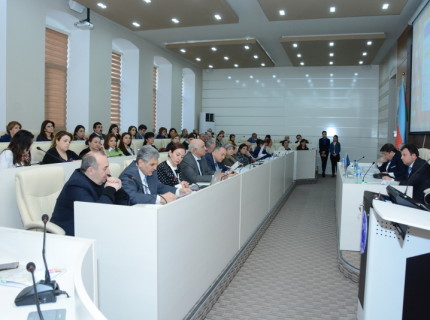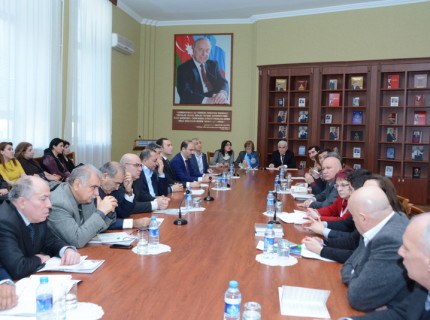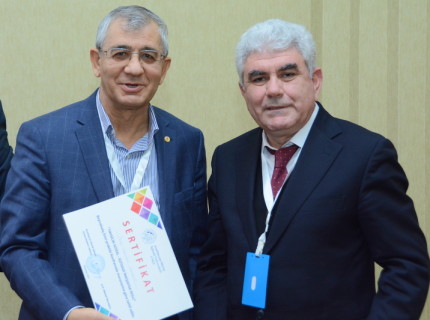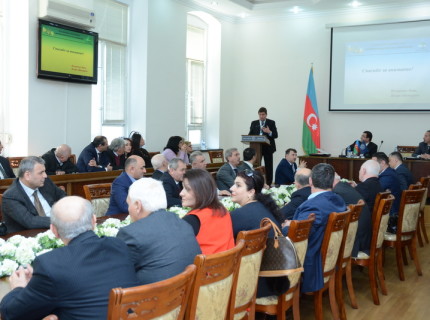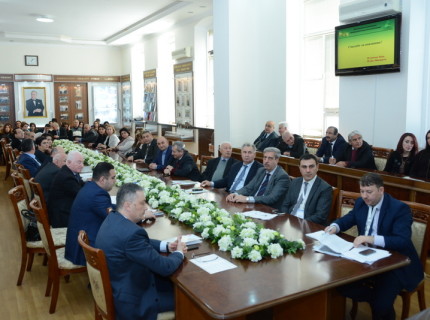The next International Conference held at UNEC: “The Role of Education in Socioeconomic Development”
An International Scientific-practical Conference on “The Role of Education in Socioeconomic Development” has started its work at UNEC on January 30. Along with the members of the Parliament, heads of higher education institutions, well-known public figures, the event was attended by the delegations from China, Hungary, Turkey, Russia, Ukraine, Kazakhstan, Kirgizstan and Lithuania.
Before the Conference, the participants paid tribute to the National Leader Heydar Aliyev’s memory in the Alley of Honors and laid a wreath at his grave. Visitors also commemorated prominent ophthalmologist, academician Zarifa Aliyeva and laid bunch of flowers on her grave.
Greeting the participants, UNEC Rector, Professor Adalat Muradov expressed his gratitude to the Minister of Education for support of the initiative to hold the event.
Rector emphasized that personnel training that meets modern requirements is inevitable in achieving goals and tasks put forward by the “Strategic Roadmap on the National Economy and the main sectors of Economy” signed by the President Ilham Aliyev. Noting that an important document sets new challenges in the face of higher education institution, Rector focused on issues faced by the universities in the execution of these tasks: “There is a huge discrepancy between the demand for higher education and meeting of that claim in the community. The society is a few years ahead of the education system with its development. Another point is that the increase of literacy on a global scale is accompanied by inequality in the world”. Despite all this, A.Muradov highlighted the significant role of education in socioeconomic development.
Considering imminent the transformation of the universities research centers, Rector said UNEC accelerated the process of creation infrastructure in this direction: “The work of the Scientific Research Institute is re-established at UNEC, scientific research laboratories are established here. One of them has set up forecasting model for the world market of “Azeri Light” crude oil, in accordance with the order of SOCAR. In addition, ranking system applied at UNEC which promote 40% for scientific research, stipulation of royalties for the articles published on the prestigious journals have significantly increased the quality and quantity of scientific researches. I note with proud 35% of scientific works carried out by UNEC employees in 2000-2016 published in scientific journals taken place in the scientific basis of “Web of Science” by Thomson Reuters agency have been performed within the last three years.
Deputy Minister of Education Jeyhun Bayramov spoke about the rapid development passed by Azerbaijan within the last 25 years: “Today, education plays an important role in socio-economic development. In a globalized world, growth means to be competitive at a global level. To achieve social development we should be competitive. Without being successful and competitive at a global level, economy cannot be considered strong. The knowledge economy draws the human factor forefront.
The Deputy Minister emphasized the crucial role of the unity of science with education in the training of highly qualified human capital.
The Vice-president of the ANAS, Chairman of the Science and Education Committee of Milli Majlis (Parliament), academician Isa Habibbayli highlighted the decisive importance of education in the destiny of any society: “A thesis “Education is the future of the nation” written by the Great Leader Heydar Aliyev both outlines the priorities of Azerbaijan’s independence and answers global challenges as well. Today, the reforms held in science, education and technology under the President Ilham Aliyev’s leadership is making its contributions to comprehensive development of Azerbaijani society.
According to Isa Habibbayli, other resources in science, education and technology are being re-discovered: “The issue set in front of education is in-depth research of natural resources, study and their use in society. The role of education in this area is important.
Deputy Minister of Economic Development Niyazi Safarov spoke about the formation of knowledge economy in the country. He said along with the economic growth for the medium and long term prospects defined by the Strategic Roadmap, determination of the targets for the development of education indicate close contact of both sides.
Noting that there is a problem in commercializing of knowledge, Deputy Minister stressed the necessity of joint action of public administration agencies and educational institutions: “Today, there is a demand for some major that we have to provide it. The role of education, sciences, economy and human capital is great in the formation of post oil economic model in the country. To achieve the strategic goals set by the President we will observe the implementation of the tasks combining these factors”.
Noting the education as an important factor in ensuring the sustainable development, the UN Resident Coordinator and the resident representative of the United Nations Development Program (UNDP) Gulam Isakzai emphasized the role of education in socioeconomic development especially. Highlighting that Azerbaijan attaches special importance to the development of the education sector, G.Isakzai said the organization he represents will provide support to UNEC within the development program along with the other educational institutions. The UN Resident Coordinator in our country especially emphasized the significance of the students’ career development, adapting training requirements of the labor market and making education accessible to those with disabilities. G.Isakzai expressed readiness to continue cooperation with UNEC.
Drawing to attention the speedy development of higher technologies in the world, Director of the Scientific Research Institute for Development of Education of the Russian University of Economics named after Plekhanov, Professor Yevgenia Valeriyevna Shubenkova noted the inevitability of online education with the creation of a digital learning environment.
The conference continued its work in the sessions on “Education and Socioeconomic Development”, “Development of Education Sector: Global Trends, Progressive Practice and Reforms”, “New Approach to the Management of the Quality of Education”. Reports by the local and overseas experts were heard in the sessions.
The conference will last two days.
